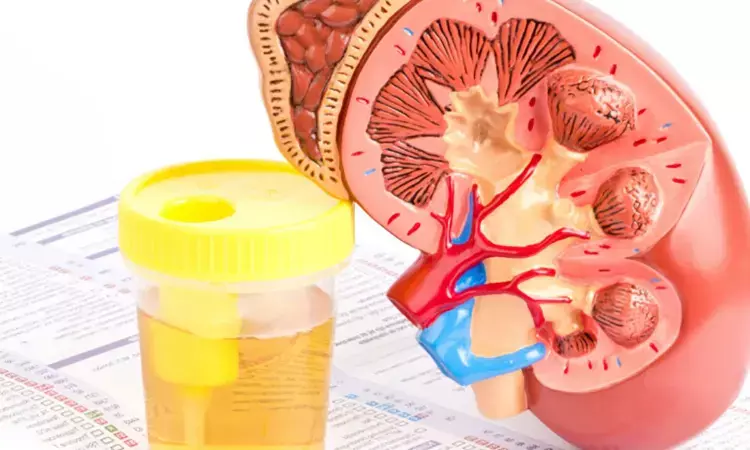- Home
- Medical news & Guidelines
- Anesthesiology
- Cardiology and CTVS
- Critical Care
- Dentistry
- Dermatology
- Diabetes and Endocrinology
- ENT
- Gastroenterology
- Medicine
- Nephrology
- Neurology
- Obstretics-Gynaecology
- Oncology
- Ophthalmology
- Orthopaedics
- Pediatrics-Neonatology
- Psychiatry
- Pulmonology
- Radiology
- Surgery
- Urology
- Laboratory Medicine
- Diet
- Nursing
- Paramedical
- Physiotherapy
- Health news
- Fact Check
- Bone Health Fact Check
- Brain Health Fact Check
- Cancer Related Fact Check
- Child Care Fact Check
- Dental and oral health fact check
- Diabetes and metabolic health fact check
- Diet and Nutrition Fact Check
- Eye and ENT Care Fact Check
- Fitness fact check
- Gut health fact check
- Heart health fact check
- Kidney health fact check
- Medical education fact check
- Men's health fact check
- Respiratory fact check
- Skin and hair care fact check
- Vaccine and Immunization fact check
- Women's health fact check
- AYUSH
- State News
- Andaman and Nicobar Islands
- Andhra Pradesh
- Arunachal Pradesh
- Assam
- Bihar
- Chandigarh
- Chattisgarh
- Dadra and Nagar Haveli
- Daman and Diu
- Delhi
- Goa
- Gujarat
- Haryana
- Himachal Pradesh
- Jammu & Kashmir
- Jharkhand
- Karnataka
- Kerala
- Ladakh
- Lakshadweep
- Madhya Pradesh
- Maharashtra
- Manipur
- Meghalaya
- Mizoram
- Nagaland
- Odisha
- Puducherry
- Punjab
- Rajasthan
- Sikkim
- Tamil Nadu
- Telangana
- Tripura
- Uttar Pradesh
- Uttrakhand
- West Bengal
- Medical Education
- Industry
Personalized kidney screening in type 1 diabetes tied to early detection and reduced testing frequency

USA: Adopting a personalized approach alternative to annual screening for patients with type 1 diabetes (T1D) can considerably reduce the frequency of urine testing and the time with undetected chronic kidney disease (CKD), a recent study in Diabetes Care has shown.
Screening recommendations for screening CKD include annual urinary albumin excretion rate (AER) testing after five years of type 1 diabetes. Albumin is a protein in the blood; too much albumin in the urine indicates kidney disease. The new studies have suggested that AER screening could be personalized to optimize early CKD detection and testing frequency.
People with T1D, specifically those at low risk of CKD development, could be tested for AER less frequently to reduce cost and burden, and those at high CKD risk could be tested more frequently to facilitate earlier detection of chronic kidney disease. Type 1 diabetes patients have an estimated 50% risk of CKD development over their lifetime. CKD can progress to kidney failure, requiring a kidney transplant or dialysis.
Against the above background, Bruce A. Perkins, Lunenfeld-Tanenbaum Research Institute, Mount Sinai Hospital, University of Toronto, Toronto, Canada, and colleagues sought to determine a risk factor-based, simple screening schedule that optimizes early CKD detection and testing frequency in patients with type 1 diabetes.
For this purpose, the researchers used measurements of urinary albumin excretion from 1,343 patients enrolled in the Diabetes Control and Complications Trial and its follow-up for the long term to produce piecewise-exponential incidence models. To identify individualized screening schedules, the likelihood of the onset of moderately or severely increased albuminuria, and its risk factors were used. A comparison was made between the time with undetected albuminuria and the number of tests with annual screening.
Following were the study's key findings:
- The 3-year cumulative incidence of increased albuminuria after normoalbuminuria during the study duration was 3.2%, strongly associated with higher AER and glycated hemoglobin (HbA1c).
- Personalized screening in 2 years for patients with current AER ≤10 mg/24 h and HbA1c ≤8%, in 6 months for those with AER 21–30 mg/24 h or HbA1c ≥9%, and in 1 year for all others were linked with 34.9% decrease in time with undetected albuminuria and 20.4% reduction in testing frequency versus annual screening.
- Stratification by HbA1c categories or AER alone was tied to reductions of lesser magnitude.
"A personalized alternative to annual kidney screening in type 1 diabetes can significantly reduce the time that chronic kidney disease goes undetected and the frequency of urine testing," the researchers conclude.
Reference:
Bruce A. Perkins, Ionut Bebu, Ian H. de Boer, Mark Molitch, Bernard Zinman, John Bantle, Gayle M. Lorenzi, David M. Nathan, John M. Lachin; on behalf of the Diabetes Control and Complications Trial (DCCT)–Epidemiology of Diabetes Interventions and Complications (EDIC) Research Group, Optimal Frequency of Urinary Albumin Screening in Type 1 Diabetes. Diabetes Care 2022; dc221420. https://doi.org/10.2337/dc22-1420
Dr Kamal Kant Kohli-MBBS, DTCD- a chest specialist with more than 30 years of practice and a flair for writing clinical articles, Dr Kamal Kant Kohli joined Medical Dialogues as a Chief Editor of Medical News. Besides writing articles, as an editor, he proofreads and verifies all the medical content published on Medical Dialogues including those coming from journals, studies,medical conferences,guidelines etc. Email: drkohli@medicaldialogues.in. Contact no. 011-43720751


